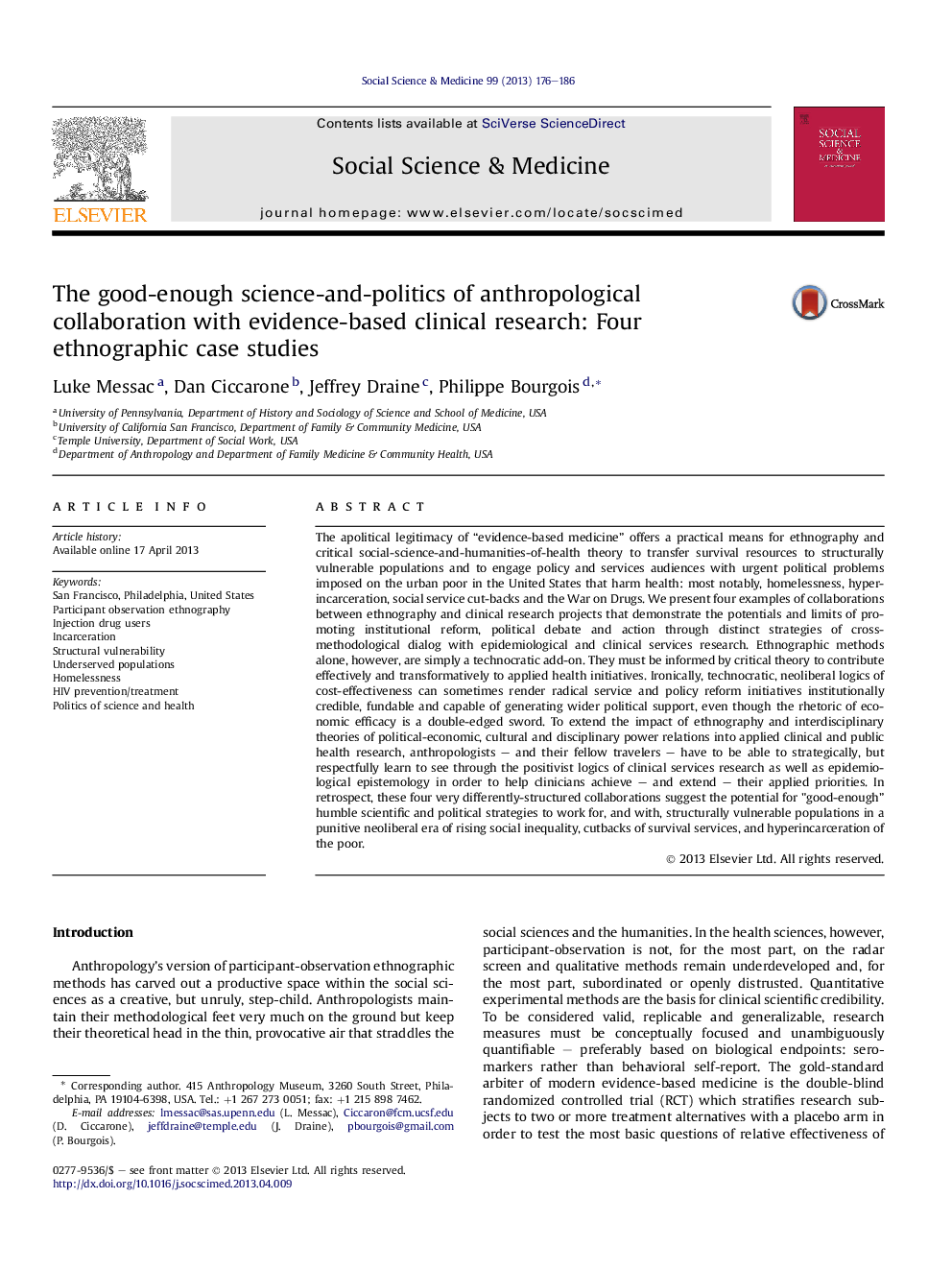| کد مقاله | کد نشریه | سال انتشار | مقاله انگلیسی | نسخه تمام متن |
|---|---|---|---|---|
| 7336504 | 1476069 | 2013 | 11 صفحه PDF | دانلود رایگان |
عنوان انگلیسی مقاله ISI
The good-enough science-and-politics of anthropological collaboration with evidence-based clinical research: Four ethnographic case studies
ترجمه فارسی عنوان
علم و سیاست کافی خوب همکاری انسان شناسی با تحقیقات بالینی مبتنی بر شواهد: چهار مطالعه مورد قوم نگاری
دانلود مقاله + سفارش ترجمه
دانلود مقاله ISI انگلیسی
رایگان برای ایرانیان
کلمات کلیدی
ترجمه چکیده
مشروعیت قطعی یک پزشکی مبتنی بر شواهد؟ وسیله ای عملی برای قوم نگاری و نظریه انتقادی علوم اجتماعی و علوم انسانی برای انتقال منابع بقای به جمعیت های آسیب پذیر ساختاری ارائه می دهد و مخاطبان سیاسی و خدمات را با مشکلات سیاسی فوری که بر فقر شهری در ایالات متحده تحمیل می کنند، آسیب می رساند. سلامتی: مهمتر از همه، بی خانمانی، حیلهگری، خدمات اجتماعی و جنگ علیه مواد مخدر. ما چهار نمونه از همکاری بین قوم نگاری و پروژه های تحقیقاتی بالینی ارائه می دهیم که نشان دهنده پتانسیل و محدودیت های ارتقاء اصلاحات نهادی، بحث سیاسی و اقدامات از طریق استراتژی های متمایز گفت و گو متقابل و با تحقیقات اپیدمیولوژیک و خدمات بالینی است. با این حال، روش های اخلاقی تنها یک افزونه تکنوکراتیک هستند. آنها باید از نظر تئوری انتقادی مطلع شوند تا بتوانند به طور مؤثر و تغییراتی به طرح های کاربردی بهداشتی کمک کنند. جالب اینجاست که منطقهای تکنوکراتیک و نولیبرالی از هزینه بهره وری، گاهی اوقات ارائه خدمات اصلاحات و سیاستهای اصلاحات سیاسی از لحاظ قانونی، قابل اعتماد و قادر به تولید حمایت سیاسی گستردهتر است، حتی اگر سخنرانی از کارآیی اقتصادی یک شمشیر دو طرفه است. برای گسترش تاثیرات قوم نگاری و نظریه های بین رشته ای از روابط قدرت سیاسی، اقتصادی، فرهنگی و انضباطی به تحقیقات بالینی و بهداشت عمومی کاربردی، انسان شناسان و مسافران هموطنان خود باید بتوانند به طور استراتژیک، اما از طریق منطق های مثبت گرا از خدمات تحقیقاتی بالینی و همچنین معرفت شناسی اپیدمیولوژیک برای کمک به پزشکان - اولویت های کاربردی خود را گسترش می دهند و گسترش می دهند. به تازگی، این چهار همکاری با ساختار بسیار متفاوت نشان می دهد که پتانسیل های "استراتژی های علمی و سیاسی خردمندانه" برای کار با جمعیت های آسیب پذیر ساختاری در دوران مجازات نئولیبرالی افزایش نابرابری اجتماعی، کاهش خدمات بقا، و پرخاشگری فقرا.
موضوعات مرتبط
علوم پزشکی و سلامت
پزشکی و دندانپزشکی
سیاست های بهداشت و سلامت عمومی
چکیده انگلیسی
The apolitical legitimacy of “evidence-based medicine” offers a practical means for ethnography and critical social-science-and-humanities-of-health theory to transfer survival resources to structurally vulnerable populations and to engage policy and services audiences with urgent political problems imposed on the urban poor in the United States that harm health: most notably, homelessness, hyperincarceration, social service cut-backs and the War on Drugs. We present four examples of collaborations between ethnography and clinical research projects that demonstrate the potentials and limits of promoting institutional reform, political debate and action through distinct strategies of cross-methodological dialog with epidemiological and clinical services research. Ethnographic methods alone, however, are simply a technocratic add-on. They must be informed by critical theory to contribute effectively and transformatively to applied health initiatives. Ironically, technocratic, neoliberal logics of cost-effectiveness can sometimes render radical service and policy reform initiatives institutionally credible, fundable and capable of generating wider political support, even though the rhetoric of economic efficacy is a double-edged sword. To extend the impact of ethnography and interdisciplinary theories of political-economic, cultural and disciplinary power relations into applied clinical and public health research, anthropologists - and their fellow travelers - have to be able to strategically, but respectfully learn to see through the positivist logics of clinical services research as well as epidemiological epistemology in order to help clinicians achieve - and extend - their applied priorities. In retrospect, these four very differently-structured collaborations suggest the potential for "good-enough” humble scientific and political strategies to work for, and with, structurally vulnerable populations in a punitive neoliberal era of rising social inequality, cutbacks of survival services, and hyperincarceration of the poor.
ناشر
Database: Elsevier - ScienceDirect (ساینس دایرکت)
Journal: Social Science & Medicine - Volume 99, December 2013, Pages 176-186
Journal: Social Science & Medicine - Volume 99, December 2013, Pages 176-186
نویسندگان
Luke Messac, Dan Ciccarone, Jeffrey Draine, Philippe Bourgois,
